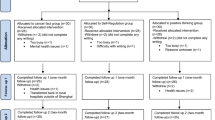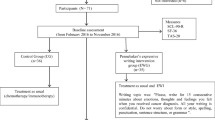Abstract
The study aimed to evaluate the effects of an expressive writing intervention on quality of life (QoL) among mainland Chinese breast cancer patients. A total of 118 Chinese breast cancer patients were randomly assigned to one of four groups: a cancer-facts writing condition (CTL group), an emotional disclosure writing condition (EMO group), a self-regulation writing condition (SR group), or a neutral control condition with no writing tasks (CON group). QoL was assessed by FACT-B at baseline, 3-, and 6-month follow-ups. A repeated measure analysis of variance revealed significant effects of time (F = 13.9, P < 0.001, η2 = 0.20) and the time × group interaction (F = 3.5, P < 0.01, η2 = 0.08) on QoL. Residualized change models showed that the CTL, EMO and SR groups reported higher levels of QoL than the CON group at the 6-month follow-up. The EMO group had a higher level of QoL than the SR group. The CTL group had higher level of physical well-being compared to the SR group. Mainland Chinese breast cancer patients shortly after diagnosis benefit from expressive writing. They benefited more from cancer-facts and emotional disclosure compared to self-regulation. The study indicated that the impact of expressive writing may differ due to stage of cancer survivorship, social, and cultural context.


Similar content being viewed by others
References
Burton, C. M., & King, L. A. (2008). Effects of (very) brief writing on health: the two-minute miracle. British Journal of Health Psychology,13, 9–14. https://doi.org/10.1348/135910707x250910
Chang, J. (2014). The interplay between collectivism and social support processes among Asian and Latino American College students. Asian American Journal of Psychology,6, 4–14.
Creswell, J. D., Lam, S., Stanton, A. L., Taylor, S. E., Bower, J. E., & Sherman, D. K. (2007). Does self-affirmation, cognitive processing, or discovery of meaning explain cancer-related health benefits of expressive writing? Personality and Social Psychology Bulletin,33, 238–250. https://doi.org/10.1177/0146167206294412
Fan, L., Strasserweippl, K., Li, J. J., St, L. J., Finkelstein, D. M., Yu, K. D., et al. (2014). Breast cancer in China. Lancet Oncology,15, e279–e289.
Ferlay, J., Soerjomataram, I., Dikshit, R., Eser, S., Mathers, C., Rebelo, M., et al. (2015). Cancer incidence and mortality worldwide: Sources, methods and major patterns in GLOBOCAN 2012. International Journal of Cancer,136, E359–386. https://doi.org/10.1002/ijc.29210
Freud, S. (1954). The origins of psychoanalysis. New York: Basic Books.
Gao, R., Hao, B., Li, H., Gao, Y., & Zhu, T. (2013). Developing simplified chinese psychological linguistic analysis dictionary for microblog. In Brain and health informatics (pp 359–368).
Gellaitry, G., Peters, K., Bloomfield, D., & Horne, R. (2010). Narrowing the gap: the effects of an expressive writing intervention on perceptions of actual and ideal emotional support in women who have completed treatment for early stage breast cancer. Psycho-oncology,19, 77–84.
Henry, E. A., Schlegel, R. J., Talley, A., & Molix, L. A. (2010). The feasibility and effectiveness of expressive writing for rural and urban breast cancer survivors. Oncology Nursing Forum,37, 749–757.
Ji, L., Tsai, W., Sun, X., Lu, Q., Wang, H., Wang, L., et al. (2019). The detrimental effects of ambivalence over emotional expression on well-being among Mainland Chinese breast cancer patients: Mediating role of perceived social support. Psycho-oncology,28, 1142–1148.
King, L. A., & Miner, K. (2000). Writing about the perceived benefits of traumatic events: Implications for physical health. Personality and Social Psychology Bulletin,26, 220–230.
Knowles, E. D., Wearing, J. R., & Campos, B. (2011). Culture and the health benefits of expressive writing. Social Psychological and Personality Science,2, 408–415.
Lepore, S. J., Greenberg, M. A., Bruno, M., & Smyth, J. M. (2002). Expressive writing and health: Self-regulation of emotion-related experience, physiology, and behavior. In S. J. Lepore & J. M. Smyth (Eds.), The writing cure: How expressive writing promotes health and emotional well-being (pp. 99–117). Washington, DC: American Psychological Association.
Li, B. (2016). Ethical review of biomedical research involving human beings. Retrieved from http://www.gov.cn/gongbao/content/2017/content_5227817.htm
Li, L., Zhu, X., Yang, Y., He, J., Yi, J., Wang, Y., et al. (2015). Cognitive emotion regulation: Characteristics and effect on quality of life in women with breast cancer. Health and Quality of Life Outcomes,13, 51.
Lu, Q., Dong, L., Wu, I. H. C., You, J., Huang, J., & Hu, Y. (2019). The impact of an expressive writing intervention on quality of life among Chinese breast cancer patients undergoing chemotherapy. Supportive Care in Cancer,27, 165–173.
Lu, Q., Gallagher, M. W., Loh, A., & Young, L. (2018). Expressive writing intervention improves quality of life among Chinese-American breast cancer survivors: A randomized controlled trial. Annals of Behavioral Medicine,52, 952–962.
Lu, Q., & Stanton, A. L. (2010). How benefits of expressive writing vary as a function of writing instructions, ethnicity and ambivalence over emotional expression. Psychol Health,25, 669–684.
Lu, Q., Wong, C. C., Gallagher, M. W., Tou, R. Y., Young, L., & Loh, A. (2017). Expressive writing among Chinese American breast cancer survivors: A randomized controlled trial. Health Psychology,36, 370–379. https://doi.org/10.1037/hea0000449
Lu, Q., You, J., Kavanagh, A., Warmoth, K., Meng, Z., Chen, Z., et al. (2016). Differences in quality of life between American and Chinese breast cancer survivors. Supportive Care in Cancer,24, 1–8.
Lu, Q., Zheng, D., Young, L., Kagawa-Singer, M., & Loh, A. (2012). A pilot study of expressive writing intervention among Chinese-speaking breast cancer survivors. Health Psychology,31, 548–551. https://doi.org/10.1037/a0026834
Papadopoulos, I., Guo, F., Lees, S., & Ridge, M. (2010). An exploration of the meanings and experiences of cancer of Chinese people living and working in London. European Journal of Cancer Care,16, 424–432.
Pennebaker, J. W. (1993). Putting stress into words: Health, linguistic, and therapeutic implications. Behaviour Research and Therapy,31, 539–548.
Pennebaker, J. W., & Beall, S. K. (1986). Confronting a traumatic event: Toward an understanding of inhibition and disease. Journal of Abnormal Psychology,95, 274–281.
Petrie, K. J., Booth, R. J., Pennebaker, J. W., Davison, K. P., & Thomas, M. G. (1995). Disclosure of trauma and immune response to a hepatitis B vaccination program. Journal of Consulting and Clinical Psychology,63, 787–792.
Richards, J. M., Beal, W. E., Seagal, J. D., & Pennebaker, J. W. (2000). Effects of disclosure of traumatic events on illness behavior among psychiatric prison inmates. Journal of Abnormal Psychology,109, 156.
Sloan, D. M., & Marx, B. P. (2004). A closer examination of the structured written disclosure procedure. Journal of Consulting and Clinical Psychology,72, 165–175. https://doi.org/10.1037/0022-006x.72.2.165
So, W. K., Marsh, G., Ling, W. M., Leung, F. Y., Lo, J. C., Yeung, M., et al. (2010). Anxiety, depression and quality of life among Chinese breast cancer patients during adjuvant therapy. European Journal of Oncology Nursing,14, 17–22. https://doi.org/10.1016/j.ejon.2009.07.005
Stanton, A. L., Danoff-Burg, S., Cameron, C. L., Bishop, M., Collins, C. A., Kirk, S. B., et al. (2000). Emotionally expressive coping predicts psychological and physical adjustment to breast cancer. Journal of Consulting and Clinical Psychology,68, 875–882.
Stanton, A. L., Danoff-Burg, S., Sworowski, L. A., Collins, C. A., Branstetter, A. D., Rodriguez-Hanley, A., et al. (2002). Randomized, controlled trial of written emotional expression and benefit finding in breast cancer patients. Journal of Clinical Oncology,20, 4160–4168. https://doi.org/10.1200/jco.2002.08.521
Wan, C., Zhang, D., Yang, Z., Tu, X., Tang, W., Feng, C., et al. (2007). Validation of the simplified Chinese version of the FACT-B for measuring quality of life for patients with breast cancer. Breast Cancer Research and Treatment,106, 413.
Wu, D. Y. H., & Tseng, W. S. (1985). Introduction: the characteristics of chinese culture. Amsterdam: Elsevier Inc.
Zachariae, R., & O’Toole, M. S. (2015). The effect of expressive writing intervention on psychological and physical health outcomes in cancer patients–a systematic review and meta-analysis. Psychooncology,24, 1349–1359.
Zakowski, S. G., Ramati, A., Morton, C., Johnson, P., & Flanigan, R. (2004). Written emotional disclosure buffers the effects of social constraints on distress among cancer patients. Health Psychology,23, 555–563. https://doi.org/10.1037/0278-6133.23.6.555
Zhao, N., Jiao, D., Bai, S., & Zhu, T. (2016). Evaluating the validity of simplified chinese version of LIWC in detecting psychological expressions in short texts on social network services. PLoS ONE,11, e0157947.
Zhou, C., Wu, Y., An, S., & Li, X. (2015). Effect of expressive writing intervention on health outcomes in breast cancer patients: A systematic review and meta-analysis of randomized controlled trials. PLoS ONE,10, e0131802. https://doi.org/10.1371/journal.pone.0131802
Acknowledgements
This study was supported by Natural Science Foundation of Shandong Province (Grant No. ZR2016GM05), Health and Family Planning Commission of Shandong Province (Grant No. 2017WS852), Science and Technology Development Plan of Weifang (Grant No. 2015WS009) and Shandong Education Department (Grant No. J17RA137). We acknowledge Dr. Lilian Shin for proofreading this manuscript and anonymous reviewers for their constructive suggestions.
Author information
Authors and Affiliations
Corresponding authors
Ethics declarations
Conflict of interest
Li-li Ji, Qian Lu, Li-juan Wang, Xiang-lian Sun, Hui-dong Wang, Bing-xue Han, Yu-feng Ma and Guo-hua Lu declare that they have no conflict of interest.
Human and animal rights and Informed Consent
All procedures followed were in accordance with ethical standards of the responsible committee on human experimentation (institutional and national) and with the Helsinki Declaration of 1975, as revised in 2000. Informed consent was obtained from all patients for being included in the study.
Additional information
Publisher's Note
Springer Nature remains neutral with regard to jurisdictional claims in published maps and institutional affiliations.
Rights and permissions
About this article
Cite this article
Ji, Ll., Lu, Q., Wang, Lj. et al. The benefits of expressive writing among newly diagnosed mainland Chinese breast cancer patients. J Behav Med 43, 468–478 (2020). https://doi.org/10.1007/s10865-019-00127-z
Received:
Accepted:
Published:
Issue Date:
DOI: https://doi.org/10.1007/s10865-019-00127-z




